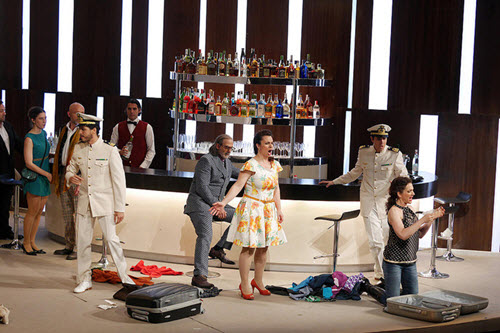 Spain Mozart: Così Fan Tutte, Liceu’s Orchestra and Chorus, Josep Pons (conductor), Gran Theatre del Liceu, Barcelona, 27 & 28.5.2015. (JMI)
Spain Mozart: Così Fan Tutte, Liceu’s Orchestra and Chorus, Josep Pons (conductor), Gran Theatre del Liceu, Barcelona, 27 & 28.5.2015. (JMI)
Production: Teatro de la Fenice
Direction: Damiano Michieletto
Sets: Paolo Fantin
Costumes: Carla Teti
Lighting: Fabio Barettin
Casts:
Fiordiligi: Juliane Banse/Maite Alberola
Dorabella: Maite Beaumont/Gemma Coma-Alabert
Ferrando: Joel Prieto/David Alegret
Guglielmo: Joan Martín-Royo/Borja Quiza
Despina: Sabina Puértolas/Ana Tobella
Don Alfonso: Pietro Spagnoli/William Berger
Mozart is not often heard at Barcelona’s Liceu although – as with many other theatres – in the past 20 years his presence has been more frequent than before. Così Fan Tutte was last performed here in 2004, and with a rather modest cast. It has now returned to the Liceu, with two different casts.
Damiano Michieletto’s staging premiered at Teatro La Fenice in Venice in February 2012. With this production at La Fenice, Mr. Michieletto crowned his Mozart/Da Ponte trilogy which presented the operas in modern settings. As I have written on other occasions about other operas, it is inevitable that from time to time what we hear in this Così does not match what we see. However, on this occasion the updating has been done in an intelligent way, with occasional cuts and changes in the texts.
Michieletto places the action in a luxury hotel on a revolving stage that allows for rapid changes of scene. The striking sets feature a reception room, a luxurious bar, the room of the Ferrara sisters, and a corridor with an elevator. The costumes are well-suited to the plot, both colorful and fun, although it would have been more appropriate to have credible Albanian disguises.
Don Alfonso is the hotel director, while the four lovers are his guests and friends; Despina is the maid. The stage direction was excellent and drew strong performances from every one on stage. One disadvantage of bringing this opera up to modern times is that the plot seems highly implausible today, but it is nicely done here and always amusing. There are a few times when the demands of the staging affect the musical development, but overall it’s a solid production that ends in a kind of tragedy with each of the six soloists venting their anger to the others.
Josep Pons was once again in the pit of the Liceu. His reading was safe and effective, although I missed a greater delicacy and lightness which are so essential in Mozart operas. His tempos were too slow in general, but the orchestra gave an acceptable performance that shows the worst times are past, even if there is still a long way to go.
For me, Mozart is absolutely essential when assessing the merit of a singer. There is no way to hide in his operas; on the contrary, strengths and weaknesses are very clear, more so than with any other composer. I do think that several of the singers here were not up to the task.
In the first cast, Fiordiligi was played by German soprano Juliane Banse, and I found her somewhat disappointing. She has an attractive presence, well-suited to the part, and good stage skills, but she is quite weak in vocal agilities and her upper register is unattractive. As the tessitura rises, her voice becomes shrill, and at the top she just shouts. In the second cast, we had Maite Alberola, whose interpretation was even less convincing. She had the same limitations as her colleague, and avoided some high notes in “Come scoglio.”
Maite Beaumont showed a good affinity for Mozart, with an appealing and consistent voice, though it is somewhat reduced in size. Gemma Coma-Alabert is a frequent interpreter of secondary roles at the Liceu. Her voice is not right for Dorabella, although she gave a fine performance.
Joel Prieto has an agreeable voice, well-suited to Ferrando, and he might have left a better impression had the arias that Mozart wrote for the character been cut. He was very monotonous in “Un aura amorosa,” with open sounds and a problematic top. David Alegret is really a tenorino, with a whitish and reduced voice, and he wasn’t very interesting in the role.
I’ve always found Joan Martin-Royo to be an excellent interpreter of the characters he plays, with the disadvantage that his voice seemed somewhat reduced and badly projected. It has been three years since I last him on stage, and I found him much improved here, especially in terms of projection. Borja Quiza was also good in the part of Guglielmo, with an agreeable voice. He seems to have the impression that his vocal volume isn’t enough (which it is); otherwise, it’s difficult to understand his insistence on pushing his voice.
Sabina Puértolas as Despina gave the most rewarding performance in either cast. She was superb in the part from beginning to end. In this kind of role, she is close to becoming a reference for performers. Mezzo soprano Ana Tobella was enjoyable as Despina in the second cast, very comfortable on stage.
In the first cast, Don Alfonso was played by Italian baritone Pietro Spagnoli, whom I found more convincing as an actor than as a singer. To begin with, he is too light for the character of the cynical Don Alfonso. In fact, his timbre is clearly lighter than the interpreters of Guglielmo. In the second cast we had William Berger, who was good as an actor but rather modest in vocal terms.
José M. Irurzun